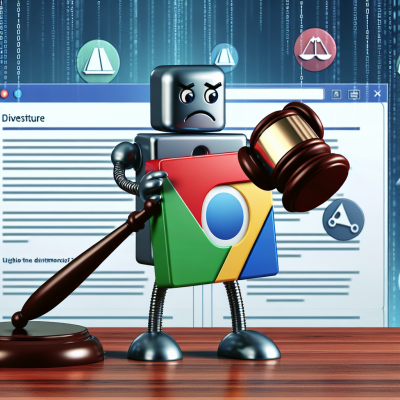
Perplexity AI Eyes Chrome Amid Google Antitrust Trial
As the U.S. government’s landmark antitrust case against Google unfolds, some surprising revelations have emerged in court. One of the most eye-catching came from Perplexity AI, an emerging artificial intelligence startup, which announced that it would be interested in taking over responsibilities for projects like Google’s Chrome browser. This statement offers a glimpse into how the rapidly evolving AI landscape is poised to reshape the tech industry—and potentially even challenge Google’s dominance.
The Trial That Could Reshape Tech Powerhouses
The antitrust case, led by the U.S. Department of Justice, focuses heavily on Google’s monopolistic control over the online search market. With billions of dollars at stake and the future structure of the internet in question, this trial has become a pivotal moment in tech law history.
One of the key questions the court is trying to answer: Is Google using its monopoly power to stifle innovation and competition? That’s where companies like Perplexity come in.
Perplexity AI: A Rising Star in Generative AI
Founded just a few years ago, Perplexity AI has emerged as a powerful player in the generative AI space. Specializing in AI-driven search and content generation, the company’s ambitions go far beyond simple chatbot models. During the trial, Dmitry Shevelenko, the Chief Business Officer of Perplexity, made headlines when he stated that the company could take on major responsibilities such as managing the Chrome browser.
“We believe our technology and team have the capability to handle that scale of a product,” said Shevelenko, underscoring the company’s readiness to challenge the tech giants.
Why Chrome Matters in the Antitrust Discussion
Google Chrome is more than just a web browser—it’s a gateway to the internet for billions of users worldwide and a cornerstone of Google’s advertising empire. The browser plays a crucial role in Google maintaining dominance in the search market by defaulting to Google Search in the address bar and reinforcing the company’s ecosystem.
In this context, Perplexity’s willingness to run Chrome is not just an ambition, it’s a statement. It signals that alternative players are ready to take on infrastructure that has long been monopolized by a few tech titans.
Breaking Monopoly Norms: A New Era for AI Firms?
Perplexity’s testimony taps into a larger trend: innovative AI companies vying for a seat at the table long dominated by incumbents like Google, Apple, and Microsoft. As generative AI transforms how we interact with content online, companies like Perplexity are positioning themselves not just as service providers—but as core infrastructure players.
This raises important questions:
- Could an AI startup like Perplexity realistically run a global product like Chrome? Possibly—but it would require massive scaling and capital resources.
- Does this indicate a shift in how we view browser technology? Almost certainly. What was once just a tool for navigation may become an AI-powered user interface for the future internet.
- What does this mean for consumer choice? More options could lead to a healthier marketplace and innovation boom.
Competition: The Lifeblood of Innovation
Google’s response to these antitrust pressures will likely determine the future of not just online search, but the broader digital experience. Should regulators decide that divestment or structural changes are necessary, companies like Perplexity could be among the first to step in and fill the void, offering AI-native alternatives to legacy products.
Dmitry Shevelenko’s court testimony is emblematic of a younger, more agile generation of tech companies eager to redesign the digital experience from the ground up.
Here’s what that could look like:
- Semantic Search Integration: Rather than keyword-matching like Google, Perplexity could offer natural language query handling right from the browser bar.
- Personalized, Transparent AI Responses: Users could ask questions and receive human-like replies grounded in verified sources.
- Disruption of the Ad-Supported Model: With less reliance on ads, new business models like subscriptions or AI-powered recommendations could emerge.
The Road Ahead: AI’s Expanding Role in the Browser Wars
If Chrome or parts of its infrastructure are ever spun off due to antitrust rulings, the gates could open for a surge of innovation driven by AI companies. Perplexity’s bold proposition sets the stage for a reimagined internet where browsing, search, and content generation are deeply integrated in a seamless, AI-first experience.
As the trial progresses, tech observers, investors, and consumers alike will be watching closely—not just for the verdict on Google’s practices, but for clues about what the next generation of web navigation will look like.
Final Thoughts: An AI-Powered Future in the Making
The willingness of an AI startup like Perplexity to take on a colossal project such as running Chrome is more than a headline splash. It’s a sign that the tech ecosystem is evolving. As AI ventures push boundaries, we may soon see a new paradigm where innovation is democratized, competition is revitalized, and user experience is completely redefined.
Stay tuned—because the browser wars are far from over, and the next chapter may be written in AI.


Leave a Reply